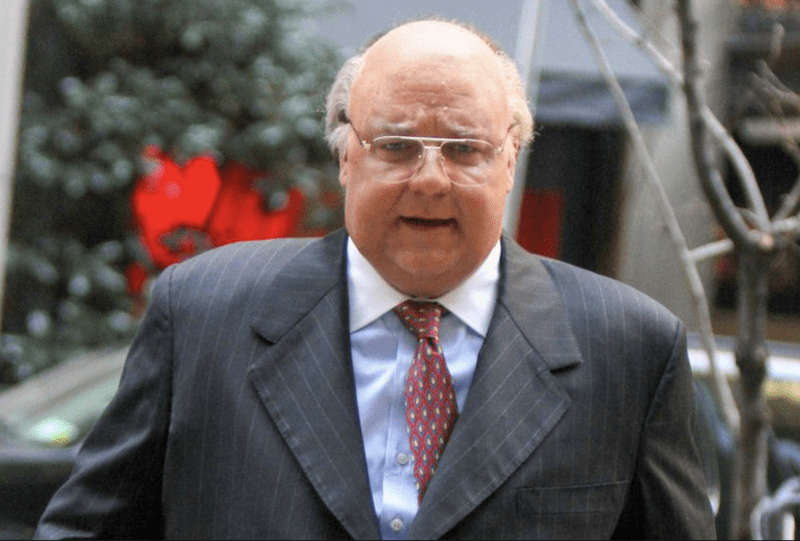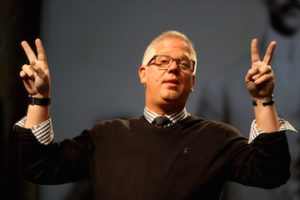Roger Ailes’ Rise and Fall Makes Good TV
"The Loudest Voice," Showtime's in-depth portrait of the creator of Fox News, explains one reason America is in the mess it’s in. Russell Crowe embodies former Fox News chief Roger Ailes in this still from "The Loudest Voice." (Showtime)
Russell Crowe embodies former Fox News chief Roger Ailes in this still from "The Loudest Voice." (Showtime)
Showtime’s “The Loudest Voice” is an in-depth portrait of a shallow man. Adapted from Gabriel Sherman’s 2014 book and subsequent reporting, “The Loudest Voice” posits Roger Ailes, who died in 2017, as the most important figure in American politics in the 21st century so far, the man who brought all the virulent forces of the right wing together, creating Fox News, which has given us Donald Trump.
Played by Russell Crowe, Ailes is a turgid monster, a toxic brew of vindictiveness, lust and gross, maudlin self-pity. He always seems one tick away from rage. Near the beginning, Ailes is finishing breakfast in a diner when a waitress cheerily tells him, “Happy Holidays!” He freezes her with a stare and replies with a menacing “Merry Christmas.”
Growing up in the blue-collar town of Warren, Ohio, Ailes was beaten by his father, who imprinted him with the message “don’t ever trust anyone.” Loyalty, he learned, wasn’t a quality to be earned but something to be wrenched from others through power and fear. On a sentimental journey, he takes his pre-teen son, Zac, to show him the town where his values were formed, but he finds Warren shabby and welfare-gutted.
In a public address to the townspeople, many of them unemployed, Roger reveals the cause of this blight—the liberal elites who have sent American jobs overseas. This was the genius stroke Ailes used to mold the Republican Party: the idea that the decline of the white working class was not the result of Reaganomics, which shifted wealth dramatically from the working class to the management class, but the fault of the so-called elites who, by the way, went to college and want to “take away your guns, let Muslim terrorists into your country, give Hispanic illegals your jobs, and let gay people get married.” The subliminal message, of course, is that when you hear “elite,” you are supposed to think “Democrat.”
Ailes’ madness manifests itself as a desire to turn America into the Warren of his youth, beginning with his new hometown in the liberal, old-money hamlet of Garrison, N.Y., about an hour from New York City. His take-no-prisoners campaign begins with the purchase of the town paper, which his wife turns into an organ for his worldview. Within a short time, the citizens of Garrison are divided into angry factions, a foreboding of the America that Fox would later fuel. Ailes was a genius who understood before anyone else the power of television and the effectiveness of narrow casting.
Most of Crowe’s best lines are quotations from Sherman’s book. At a staff meeting in Fox’s early stages, Crowe gives the troops his game plan. “Who’s our audience?” he asks the room. “Everyone,” someone replies. “No,” he corrects her, “we don’t need everyone.” The point is to bring the ideological faithful together, and the purpose of journalism, according to Ailes, is to serve that ideology. “PR is going to be the engine,” he tells an aide. “The news people are going to work for us.”
All vestiges of fair and balanced reporting quickly evaporate. During a point-counterpoint segment with Fox’s token liberal commentator, Ailes tells his people to hold the makeup for the liberal so that “you can see him sweat.”
Crowe’s performance as Ailes is already being likened to George C. Scott’s as World War II Gen. George Patton. But Crowe is a far more nuanced actor than Scott and more capable of conveying his character’s neuroses. And Scott’s Patton seemed greater because he was surrounded by nonentities; “The Loudest Voice” always positions Ailes near a vivid character, starting with Seth McFarlane, eyes gleaming and pearly whites flashing as Ailes’ hatchet man, Brian Lewis; stage veteran Simon McBurney as a surprisingly restrained Rupert Murdoch, head of Fox parent company News Corp. and apparently the only check on Ailes; Patch Darragh, who plays Sean Hannity as an empty vessel waiting to be filled by Ailes (you can see the Trumpian sycophant beginning to take shape); and Josh McDermitt’s Glenn Beck, who looks like, Ailes says, “a fucking armadillo with a hairpiece.”
It’s the women, though, who, after Crowe’s Ailes, make the story. Annabelle Wallis is heartbreaking as Fox client booker Laurie Luhn, whose relationship to Ailes seems to bring her closer to hell with each episode. (One of their sexual encounters should come with an on-screen warning; you may not ever be able to remove the scene from your memory.)
Sienna Miller gives a better performance than was called for in the role of Beth Ailes, who begins as Ailes’ employee and mistress at CNBC, then flounders as his wife, but ultimately is rejuvenated by the power and prestige she comes to command as Mrs. Roger Ailes.
Most tantalizing is Naomi Watts as Gretchen Carlson, who has certainly had spectacular luck in casting—Nicole Kidman is playing her in an upcoming feature film. Carlson is the woman whose allegations of sexual harassment finally brought Ailes down (seven others subsequently came forward).
Watts has only a minimal part in the four episodes that have so far been released, but the artful Naomi, one of the great screen actresses of our time, keeps entering the story through side doors, each time hinting that she’s going to take over the story. Crowe and Watts are old friends who worked together once before in Australia, and you can sense the pleasure they take in their cat-and-mouse back and forth. Watch carefully the hard-edged smile she gives when he asks her to do “a little Miss America twirl” for him and her suppressed anger as she walks away.
It’s too early to assess the critical response for “The Loudest Voice,” as only four of the seven episodes have been released, and many critics have only written about the first two. But it’s distressing to see such amiable fluff as “Brooklyn Nine-Nine” and “The Good Place” get such high praise while so many are dismissive of such an important miniseries.
Sophie Gilbert writes in The Atlantic that “The Loudest Voice” is “more intent on probing the political and sociological impact of Fox News than the ferociously complicated psychology of the man who created it. It’s a worthy mission, but it leaves the character at the center of the series at something of a distance.” But getting you inside the psyche of Roger Ailes is exactly what “The Loudest Voice does.” And what would make Gilbert or anyone else think that there’s more to Ailes than they’re seeing?
A bizarre dis comes from Daniel Fienberg in The Hollywood Reporter, complaining that “a cottage industry has risen up of preach-to-the-choir productions determined to use wigs and augmented jowls to illustrate for liberal audiences how conservative ideology was formed.” But the subject of “The Loudest Voice” is how Fox News gathered a choir and then preached to it. Does Fienberg believe that this isn’t how conservative ideology was formed? And why does he think that “The Loudest Voice” is only “for liberal audiences”? Simply because so-called conservatives will dismiss it without watching it?
Another thing: Regarding Fienberg’s complaints about the use of prosthetics (such as “Crowe’s latex-encased O-face”), probably half the films and TV shows we watch utilize computer-enhanced imagery; why the criticism of prosthetics and makeup designed to make an actor look like a character—especially when it works? Does anyone think Robert DeNiro was more convincing as boxer Jake LaMotta because he put on 40 pounds instead of just using padding? Crowe doesn’t seem encumbered by the makeup, he seems liberated by it.
What are critics of “The Loudest Voice” seeing, what are they thinking? What sense of discomfort or intrinsic disdain keeps them from seeing what this show is and what it’s about? I defy anyone to watch three consecutive hours of Tucker Carlson, Sean Hannity and Laura Ingraham and tell me that “The Loudest Voice” isn’t an authentic origin story.
Your support matters…Independent journalism is under threat and overshadowed by heavily funded mainstream media.
You can help level the playing field. Become a member.
Your tax-deductible contribution keeps us digging beneath the headlines to give you thought-provoking, investigative reporting and analysis that unearths what's really happening- without compromise.
Give today to support our courageous, independent journalists.






You need to be a supporter to comment.
There are currently no responses to this article.
Be the first to respond.